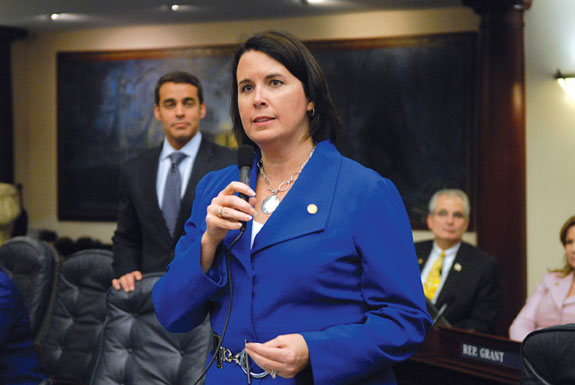
State Sen. Kelli Stargel, R-Lakeland, has an interest in 11 properties in Polk County and a townhouse in Tallahassee. (Photo courtesy of the Florida Senate.)
By Steve Miller
Florida Center for Investigative Reporting
What happened to last fall’s happy talk about ethics reform in the statehouse? There was noise about disclosure and broadening those requirements to make it more difficult to create laws that could potentially help legislators in their day jobs.
State Sen. Kelli Stargel, R-Lakeland, would no doubt be in favor of that. The veteran landlord has an interest in 11 properties in Polk County as well as a townhouse in Tallahassee. She and her husband, former state Rep. John Stargel, operate WWJD Properties, a real estate firm that Kelli has been part of since 2009.
But to the public, Kelli Stargel’s real estate interests stop at eight properties on which her name appears on the deed. The state’s financial disclosure laws don’t require her to declare her interest in four WWJD Properties on her annual financial disclosure form.
It’s part of the system that allows assets and interests to go unreported. In the case of a business, such as WWJD, disclosure by legislators is limited to over a 5 percent interest in “state and federally chartered banks; state and federal savings and loan associations; cemetery companies; insurance companies (including insurance agencies); mortgage companies; credit unions; small loan companies; alcoholic beverage licensees; pari-mutuel wagering companies; utility companies; entities controlled by the Public Service Commission; and entities granted a franchise to operate by either a city or a county government,” according to ethics form instructions.
In the case of property, “you only need to disclose that if your name is on the deed,” a spokeswoman from the Florida Commission on Ethics said.
Nor do state ethics laws require her to divulge the real estate interests of her husband, even though they can potentially impact her own wealth.
John Stargel, who is now a circuit court judge, is a manager or managing member in several other real estate companies, including Green Star Properties, Polk Premier Properties and SMS Properties, which own a combined seven more properties in Polk County.
So far this session, Kelli Stargel has introduced four bills that would impact the state’s property laws or an individuals property, including SB 490, which gives landlords a higher hand in disputes with tenants.
The Associated Press asked Stargel about the bill. She answered: “Nothing in this bill is specific to just me, or narrowly drafted in a way that could be construed to just me.”
The newspaper also asked her about the appointment of lawmakers to committees that could benefit them in their day jobs.
Stargel said that the Legislature is helped by people who have a background in legislation under consideration. She said it would be “ignorant” to not rely on educators, for example, when considering education bills.
Under existing ethics rules adopted by the House and Senate, legislators must abstain from voting on anything that benefits them directly. They must file a disclosure form if they abstain or if they vote on something that would benefit their employer or a family member. Pending bills would make it state law.
Texas is among the many other states with disclosure laws that can be circumvented, a side effect of a part-time legislature.
Among the other property-related bills Stargel has introduced this session is a measure to create an enterprise zone in Polk County.
A 2009 newspaper profile said her career as a landlord began as “the Stargels had bought a house each place they had lived and rented them when they left.”
Records show that Stargel purchased four of the eight of Stargel’s Polk County holdings since 2010. The Stargels’ primary address was purchased in 2002, and other properties were bought in 2004, 2006 and 2007. She was first elected to the statehouse in 2008.
